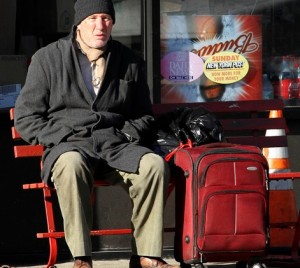Social Work Review: “Time Out of Mind” is a Must-See Film
“Time Out of Mind”
Category: Drama
Review by Kathryn Gurland, LCSW
RATING (Out of Five SocialWorkersSpeak.org Megaphones):

Be prepared – “Time Out of Mind is a dark film, as it should be. Homelessness is a very dark reality that exists. And since people prefer to ignore its existence, it mostly remains a hidden tragedy, hence the film’s darkness suits the topic on many levels.
The film’s director and screenwriter Oren Moverman, has created a realistic, believable, deeply felt Kafkaesque situation lived out by “George, played actor Richard Gere, whose performance is Oscar worthy for certain.

Richard Gere portrays George, a man who becomes homeless, in “Time Out of Mind.” Photo courtesy of lejournaldessorties.com.
The film definitely feels long. However I believe that the length of the film is intentional – the feeling one gets is one of wanting this tragedy to be over, for the film to end so that we don’t have to witness more of the carnage perpetuated by a totally dysfunctional social services system and for the “there’s no way out of this” feeling to stop.
Moverman has done a dramatic yet believably realistic portrayal of Richard Gere’s character, George, as he descends slowly into a decomposing situation that is so foreign to him and his previous lifestyle that he cannot even recognize that he is homeless until midway into the film.
This descent unfolds subtly yet powerfully as we witness George eventually doing previously unimaginable things such as picking food out of a trash can and begging in the street with a cup.
Those scenes hit home in a way that make the viewer cringe, and at the same time, leave the impact of how fast the slippery slope of homelessness can cause a person to have to do the unimaginable merely in order to stay alive.
Moverman also includes George’s choices to purchase alcohol with the little money that he does manage to obtain (even selling his designer coat in the middle of winter), which people tend to judge harshly. But, in this film, as you witness George swallowing from his brown bag covered elixir, one can’t help but empathize with George’s choice to medicate himself in the midst of such a hopelessly frustrating situation.
“Time Out of Mind” is playing in limited theaters. Check your local listings. It may also be available on video-on-demand from your cable or satellite television provider.
George’s wallet has been stolen. He has no proof of identification whatsoever. Yet he is forced to navigate the byzantine process of getting admitted to a shelter, all while trying to reconnect with his estranged daughter Maggie (actress Jenna Malone), who has been burned so frequently by her father’s past failures that she has no tolerance for him, nor shows empathy for his situation.
Having met Oren Moverman, and knowing his profound respect for social workers, I was glad to hear that he consulted with the National Association of Social Workers while prepping for this film. NASW’s New York City Chapter arranged for Moverman and his staff to visit homeless shelters.

Tonye Patano portrays “Mrs. Jackson,” an intake worker at a homeless shelter who portrays a social worker-like role. Screen shot from film.
Although no person in the film is ever identified as a social worker, there is an intake worker named Mrs. Jackson (actress Tonye Patano) who exhibits the kind of empathy and respect that we social workers are known for, while engaging with George. So it’s a shame that she was not given the title of social worker – that would have been a role we would have been proud to see represented on the big screen.
(Director, screenwriter Oren Moverman later confirmed Mrs. Jackson is a social worker but her profession is not explicitly said in the film).
However, where Moverman’s consulting with the New York City social workers who actually work within the homeless system becomes apparent is twofold:
- The way that he did not fictionalize nor “Hollywoodize” the conditions of life on the streets and in the shelters, the film’s realism is completely accurate
- The way Gere portrayed the seriously flawed and completely unhelpful social services system that still exists in today’s times.
Something that impressed me upon reflecting on the film afterwards, was that the real philosophical essence and the core of the message that the film delivers about the plight of the homeless was not delivered by George, or his daughter, or the social services staff, but instead was delivered by the homeless characters themselves. They told their stories, they relayed the truth, and they enlightened us to the reality that “there but…..” anyone of us could wind up where they are.
Ben Vereen, known primarily for his incredible Broadway musical successes, also gives an Oscar worthy portrayal of a non-stop loudly chattering homeless veteran who attaches himself to George, to the point of annoyance, all the while offering gems of wisdom and insight and befriending George in spite of George’s reluctance.

Ben Vereen portrays Dixon in “Time Out of Mind.” Photo courtesy of the NY Daily News.
Of additional note, is the performance by Kyra Sedgwick, who thanks to an incredible make-up and costume transformation, is practically unrecognizable in her role.
Her short but vibrant scenes with Gere are endearing, and the resilience and adaptation to her hopeless situation she represents is yet another message not to be overlooked.

Kyra Sedgwick in “Time Out of Mind.” Photo courtesy of womanaroundtown.com.
“Time Out of Mind” most definitely delivers its message and elucidates a hidden tragedy that the public needs to recognize.
For social workers who work within the homeless system, this film validates your frustrations, your insurmountable challenges, and the intensity of the work that you do.
I would hope that anyone you know who sees this film would have a newfound respect for the work that you do, and I would recommend that you encourage those that you care about to see it. I know that I, as a social worker, walked out of the film feeling an increased admiration and awe about all of you!
And for any family members or friends that have ever had a relative fall into the abyss of a homeless lifestyle, I strongly encourage you to go see this film – it will help you understand the complex pitfalls that contribute to this unpredictable and severely sad outcome.
By the way everyone, there is a very subtle and beautifully directed hopeful ending!
Kathryn Gurland, LCSW, is a psychotherapist and cancer navigation consultant in private practice in New York City. After several years of clinical work as a medical social worker and private psychotherapist, specializing in psycho-oncology, pain and palliative care and end-of-life-care, Kathy launched a private practice – PEG’S Group, LLC. PEG’s Group was conceived and designed by Kathy to meet the vital unmet needs within the cancer community.
| Leave A Comment
Advertisement
Leave a Comment
You must be logged in to post a comment.


